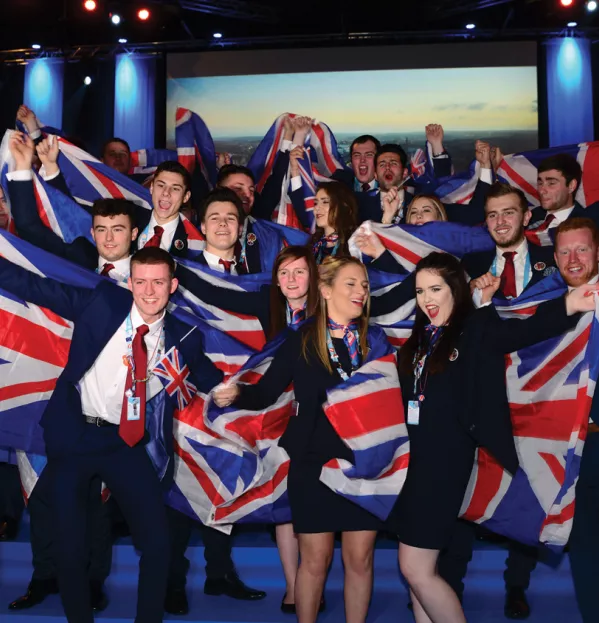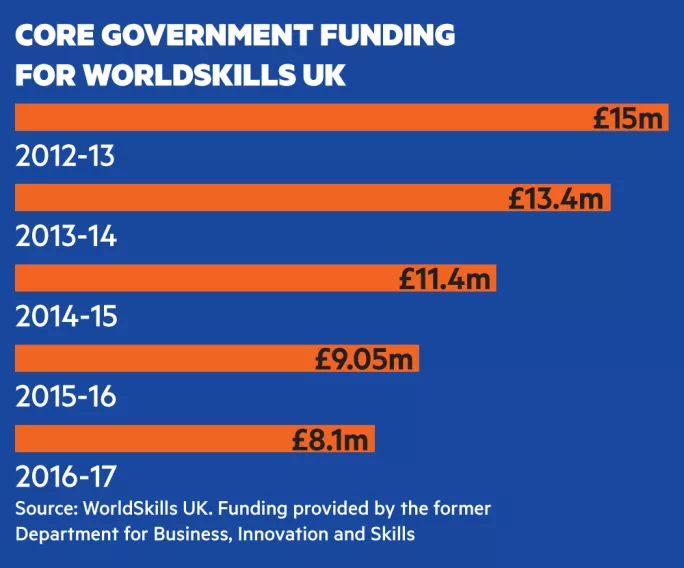Team UK is on top of the world - but for how long?

EuroSkills 2016 has been a competition to remember for Team UK, with its representatives returning from Gothenburg in Sweden with a record haul of medals.
But the organisation behind the UK’s successful campaign has warned that a series of funding cuts have left it at a “tipping point”.
Carole Stott, chair of WorldSkills UK, told TES that, without additional financial support from the government, the body would struggle to replicate this success at WorldSkills, the biggest international skills contest, which takes place in Abu Dhabi next year. Figures obtained by TES show that core government grants for WorldSkills UK have dropped by almost half over the past four years, from £15 million in 2012-13 to £8.1 million in 2016-17 (see graphic, below).

“We are at a tipping point,” Ms Stott said. “We have had significant cuts in funding over the last few years, as has everybody else. We couldn’t continue to deliver the integrated model that we have, with the impact it has, if it is cut any further.
“We have Abu Dhabi next year, and that will require additional investment. We have got to get a team to Abu Dhabi, and we don’t know what our settlement is going to be. From the modelling we have done, I don’t think we could do the big international competition, get a strong team to Abu Dhabi, with everything that involves, and run an integrated show on exactly the same funding we had last year.”
The warning comes after the UK recorded its strongest ever EuroSkills results in Sweden. After three days of competition against peers from 34 nations, UK competitors won gold in two disciplines, silver in another and bronze in two more (see box, below).
In addition to these medals, 18-year-old Daniel McCabe won gold in 3D game design - a demonstration skill included at EuroSkills for the first time.
More support, more impact
WorldSkills UK, formerly known as Find a Future, runs regional and national skills competitions, including the annual Skills Show. It supports UK participants taking part in the biennial EuroSkills and WorldSkills contests, as well as conducting research and operating role-model schemes and careers events.
About 60 per cent of WorldSkills UK’s funding comes from government, with the rest provided by private companies.
“We wouldn’t attract the other investment without that government funding,” Ms Stott, who is also chair of the Association of Colleges, told TES. “We can grow the impact of what we do with more support. Actually, this is a very modest investment with a huge impact…which is actually really very profound and has never been more important than it is now.”
WorldSkills UK chief executive Neil Bentley said that, with Brexit on the horizon, the country had more work to do in order to develop the skills it needed. “What you see at EuroSkills not only shows how the UK is doing, it really brings home the fact we are competing economically,” he added. “It is about demonstrating the level of standard and competence but it is also about how we take that learning back into the system.
“The Institute for Apprenticeships is about [ensuring we have] world-class standards. Our experts know what that looks like; they are training the competitors to those standards to be able to compete. And that is good not just for the young people but for the economy.”
This is good not just for the young people but for the economy
Mark Dawe, chief executive of the Association of Employment and Learning Providers, said the government “should be putting more money in, not less”.
“At the moment, WorldSkills UK is living year by year, and can’t plan for Abu Dhabi next year, let alone EuroSkills Budapest the following year,” he said. “There should be a three- or four-year budget that allows that planning to be done.
“WorldSkills is about finding excellence in each sector. Their standards define competence, and WorldSkills define the absolute excellence. Competition motivates learners, the providers and the experts.”
Simon Bartley, president of WorldSkills International, said he would like the UK to become less dependent on government funding but stressed: “I would prefer the government putting more money in, rather than less money in.”
David Russell, chief executive of the Education and Training Foundation, said that when correctly used, WorldSkills competitions could be “part of a powerful system-wide effect of raising the quality of technical, professional and vocational training”.
He added: “There is no public spending likely to bring greater return on investment for the UK than investment in the quality of our teaching and training workforce.”
The Department for Education was approached for comment.
You need a Tes subscription to read this article
Subscribe now to read this article and get other subscriber-only content:
- Unlimited access to all Tes magazine content
- Exclusive subscriber-only stories
- Award-winning email newsletters
Already a subscriber? Log in
You need a subscription to read this article
Subscribe now to read this article and get other subscriber-only content, including:
- Unlimited access to all Tes magazine content
- Exclusive subscriber-only stories
- Award-winning email newsletters